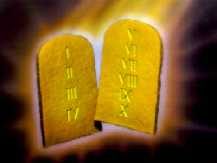
The Ten Commandments
Evidence of Their Existence Before Mount Sinai and Their Continuation in the New Testament
Introduction
The Ten Commandments are often viewed as a set of laws given exclusively to the Israelites at Mount Sinai, leading to the belief that they were only for the Jewish people. However, a closer examination of Scripture reveals that these moral laws existed long before they were formally written down on stone tablets. Furthermore, the New Testament reaffirms the enduring nature of these commandments, even after the resurrection of Jesus, indicating that they were not "nailed to the cross" but continue to hold relevance for all believers.
Sin and the Law
According to the Bible, sin is defined as the breaking of God's law. In 1 John 3:4 (NKJV), it states, "Whoever commits sin also commits lawlessness, and sin is lawlessness." This verse clearly establishes that sin is directly related to the violation of God's law. Therefore, the existence of sin implies the existence of a law that defines what sin is.
This principle also applies to the earliest events in the universe. The Bible tells us that Lucifer, who later became Satan, was the first to sin, rebelling against God in Heaven. For Lucifer’s rebellion to be considered sin, there must have been a law in place even in Heaven. Ezekiel 28:15 describes Lucifer’s fall: "You were perfect in your ways from the day you were created, till iniquity was found in you." Iniquity, or sin, could only exist if there was a law that Lucifer violated. Thus, God’s moral law, as expressed in the Ten Commandments, is eternal and was in place even before humanity was created.
Moreover, if there were no law today, then there would be no sin, for sin cannot exist without a law to define it. Paul reinforces this idea in Romans 7:7, where he writes, "What shall we say then? Is the law sin? Certainly not! On the contrary, I would not have known sin except through the law." This statement confirms that the law is essential for identifying sin, and without the law, there would be no concept of sin.

Old Testament (Before Mt. Sinai)
Worship of the True God (1st Commandment)
Genesis 4:3-5: The story of Cain and Abel shows that God had expectations about worship, indicating an understanding of what is acceptable to God, rooted in the first commandment.
Genesis 35:2-4: Jacob instructs his household to put away foreign gods, demonstrating a pre-Sinai awareness of the commandment to worship the true God alone.
Genesis 12:7-8: Abraham builds altars to the LORD and calls on His name after God appears to him, reflecting exclusive worship of the true God.
Genesis 14:18-20: Melchizedek, the king of Salem and priest of God Most High, blesses Abraham in the name of the true God, indicating worship of God before the commandments were given.
Genesis 22:9-12: Abraham’s willingness to sacrifice Isaac as an act of obedience to God shows his exclusive devotion to the true God.
Genesis 26:24-25: Isaac builds an altar and calls on the name of the LORD after God confirms His covenant with him, reflecting worship of the true God alone.
Exodus 1:17-21: The Hebrew midwives fear God and refuse to obey Pharaoh’s orders to kill the male Hebrew babies, showing their allegiance to the true God over human authority.
Prohibition of Idolatry (2nd Commandment)
Genesis 31:19, 34: Rachel’s theft of her father’s household gods suggests that idolatry was known and implicitly condemned even before the formal giving of the law.
Exodus 32: The Israelites' creation of the golden calf after leaving Egypt illustrates an existing awareness that idolatry was wrong, as their actions were met with severe judgment.
Genesis 35:2-4: Jacob instructs his household to "put away the foreign gods that are among you, purify yourselves, and change your garments." This action reflects an early understanding of the rejection of idols.
Genesis 11:4-9: The story of the Tower of Babel demonstrates humanity's attempt to make a name for themselves through their own creation, which can be seen as an early form of idolatry, and God’s intervention shows His disapproval.
Genesis 19:15-17, 26: Lot's wife turns into a pillar of salt after looking back at Sodom, possibly indicating a lingering attachment to the corrupt and idolatrous city, which was destroyed by God.
Genesis 35:1: God instructs Jacob to go to Bethel and make an altar to God, who appeared to him when he fled from Esau, implying the need to worship the true God and reject other forms of worship.
Reverence for God’s Name (3rd Commandment)
Genesis 4:26: “Then men began to call on the name of the Lord.” This phrase indicates an early practice of revering God’s name, which aligns with the commandment against taking God’s name in vain.
Genesis 24:3: Abraham makes his servant swear by the Lord, reflecting a deep reverence for God's name, which is a principle found in the third commandment.
Genesis 12:8: After receiving God’s promise, Abraham builds an altar to the Lord and calls upon His name, showing respect and reverence for God.
Genesis 14:22-23: Abraham swears an oath to the king of Sodom in the name of “the LORD, God Most High, Creator of heaven and earth,” demonstrating the serious and sacred use of God’s name.
Job 1:21: Job, in his suffering, reveres God’s name by saying, “The Lord gave, and the Lord has taken away; blessed be the name of the Lord,” showing that even in adversity, God's name is to be honored.
Exodus 3:13-15: When God reveals His name, “I AM WHO I AM,” to Moses, it shows the sacredness of God's name and the importance of revering it.
Observance of the Sabbath (4th Commandment)
Genesis 2:2-3: God sanctified the seventh day at creation, setting it apart as a day of rest long before the Ten Commandments were given.
Exodus 16:4, 5 The gathering of manna and the instructions regarding the Sabbath rest demonstrate the observance of the Sabbath before the commandment was given at Sinai.
Genesis 8:10, 12: Noah sends out the dove at intervals of seven days, which may suggest a recognition of a seven-day cycle and a connection to the Sabbath.
Genesis 29:27-28: Laban tells Jacob to “fulfill her week,” referring to a period of seven days, indicating a familiarity with a seven-day cycle that could be linked to the Sabbath.
Exodus 5:5: Pharaoh accuses Moses and Aaron of making the Israelites rest from their labors, which some interpret as an early reference to Sabbath observance, as the word used for "rest" is related to the Sabbath.
Honor for Parents (5th Commandment)
Genesis 9:20-27: The story of Noah and his sons illustrates an early recognition of the importance of honoring one’s parents, with blessings and curses associated with their actions.
Genesis 18:19: God commends Abraham for commanding his children to follow His ways, showing an early adherence to the principle of honoring parental authority.
Genesis 28:6-7: Esau observes that Jacob obeys his father and mother by going to Padan Aram, demonstrating the importance of honoring parents through obedience.
Genesis 37:13: Joseph obeys his father Jacob’s command to check on his brothers, reflecting the principle of honoring one’s parents through respectful actions.
Genesis 45:9-11: Joseph, in his position of power, honors his father by ensuring his well-being during the famine, illustrating a commitment to caring for and respecting his parent.
Exodus 4:18: Moses shows respect for his father-in-law, Jethro, by asking for permission to return to Egypt, acknowledging Jethro’s authority and honoring him in the process.
Prohibition of Murder (6th Commandment)
Genesis 4:8-12: The story of Cain and Abel explicitly condemns murder, with Cain being punished by God for killing his brother.
Genesis 9:6: After the flood, God explicitly states that murder is forbidden, saying, "Whoever sheds human blood, by humans shall their blood be shed."
Genesis 4:23-24: Lamech's account of killing a man and then fearing retribution indicates an early understanding that taking a life was wrong and carried consequences.
Genesis 37:21-22: Reuben intervenes to prevent his brothers from killing Joseph, showing an awareness that murder is morally wrong.
Genesis 42:22: Reuben reminds his brothers of the guilt they would bear for planning to kill Joseph, which reflects a recognition of the sinfulness of murder.
Exodus 2:11-14: Moses flees Egypt after killing an Egyptian, knowing that what he did was wrong and fearing the consequences, which suggests an inherent understanding of the prohibition against murder.
Prohibition of Adultery (7th Commandment)
Genesis 20: Abraham’s interaction with Abimelech, where God intervenes to prevent Abimelech from committing adultery, shows that the concept of marital faithfulness was known before Sinai.
Genesis 39: Joseph’s refusal to commit adultery with Potiphar’s wife reflects an awareness of the sanctity of marriage.
Genesis 12:17-19: Pharaoh’s reaction after discovering that Sarai was Abraham’s wife (and not his sister, as Abraham had claimed) indicates an understanding that taking another man’s wife is wrong.
Genesis 26:7-11: Isaac’s similar deception regarding Rebekah and the response of Abimelech, who commands his people not to touch her, further reflects the recognition of adultery as a sin.
Genesis 34:2-7: The reaction of Jacob’s sons to the defilement of their sister Dinah by Shechem shows an understanding of the serious nature of violating the marital or sexual boundaries, which aligns with the prohibition against adultery.
Job 31:1, 9-11: Job makes a covenant with his eyes not to look lustfully at a woman and acknowledges that if he had committed adultery, it would have been a heinous crime deserving of judgment.
Prohibition of Theft (8th Commandment)
Genesis 31:30-32: Laban accuses Jacob of theft, and Jacob’s strong denial reflects an understanding that theft was wrong.
Genesis 44: Joseph’s brothers are accused of stealing his cup, and their reaction shows that theft was considered a serious offense.
Genesis 21:25-27: Abraham confronts Abimelech over a well that Abimelech's servants had seized. The issue is resolved by making a covenant, indicating that taking what belongs to another was seen as wrong.
Genesis 14:21-24: After rescuing Lot and recovering the goods taken by enemy kings, Abraham refuses to take any of the recovered goods for himself, showing his respect for others’ property.
Exodus 3:22: God instructs the Israelites to ask the Egyptians for silver, gold, and clothing before they leave Egypt, contrasting this with outright theft and indicating that taking something without permission was understood to be wrong.
Job 24:2-4: Job condemns those who move boundary stones, take flocks by force, and take advantage of the poor, showing an understanding that theft and injustice are wrong.
Prohibition of False Witness (9th Commandment)
Genesis 12:10-20: Abraham’s deception regarding Sarah, his wife, leads to problems, indicating the value of truthfulness even before the formal giving of the law.
Genesis 39: Joseph’s experience with Potiphar’s wife’s false accusation highlights the injustice of bearing false witness.
Genesis 37:31-33: Joseph’s brothers deceive their father Jacob by presenting Joseph’s coat smeared with blood, falsely leading Jacob to believe that Joseph has been killed.
Exodus 23:1: God commands, "You shall not circulate a false report. Do not put your hand with the wicked to be an unrighteous witness," reflecting an early understanding of the prohibition against false testimony.
Leviticus 19:16: The law states, "You shall not go about as a talebearer among your people; nor shall you take a stand against the life of your neighbor. I am the LORD," reinforcing the prohibition of spreading false information and bearing false witness.
Prohibition of Coveting (10th Commandment)
Genesis 3:6: The desire of Eve for the forbidden fruit can be seen as an early example of coveting, leading to the first sin.
Genesis 6:5: The description of humanity's evil thoughts and desires before the flood reflects a world where coveting and other sinful desires were rampant.
Genesis 4:6-7: God speaks to Cain about his anger and warns him that sin is crouching at the door, suggesting that Cain’s jealousy and desire for his brother’s favor led him to murder.
Genesis 25:29-34: Esau sells his birthright to Jacob for a bowl of stew, driven by his immediate desire and lack of regard for his birthright, which reflects a form of coveting.
Genesis 30:1-2: Rachel’s jealousy of Leah’s children and her desire for children lead her to demand that Jacob give her children or else she would die, illustrating coveting through envy and desire.

New Testament (After the Cross of Jesus)
Worship of the True God (1st Commandment)
1 Corinthians 8:6: Paul emphasizes the worship of one God, the Father: “Yet for us there is one God, the Father, of whom are all things, and we for Him; and one Lord Jesus Christ, through whom are all things, and through whom we live.”
James 2:19: James warns, “You believe that there is one God. You do well. Even the demons believe—and tremble!”
Revelation 15:4: The hymn of the heavenly beings declares, “Who shall not fear You, O Lord, and glorify Your name? For You alone are holy. All nations shall come and worship before You, for Your judgments have been manifested.”
1 Timothy 1:17: Paul praises God as “the King eternal, immortal, invisible, to God who alone is wise, be honor and glory forever and ever. Amen.”
Acts 17:23: Paul, while speaking to the Athenians, refers to an altar to an “unknown God” and declares that this God, whom they worship in ignorance, is the one true God who created all things.
Prohibition of Idolatry (2nd Commandment)
1 Corinthians 10:14: Paul warns the Corinthians, “Therefore, my beloved, flee from idolatry.”
1 John 5:21: John concludes his epistle with the admonition, “Little children, keep yourselves from idols.”
Acts 14:15: Paul and Barnabas, when confronted by the people of Lystra who mistake them for gods, declare, “Men, why are you doing these things? We also are men with the same nature as you, and preach to you that you should turn from these useless things to the living God, who made the heaven, the earth, the sea, and all things that are in them.”
Galatians 5:19-21: Paul lists idolatry as one of the works of the flesh, which are contrary to living by the Spirit, and warns that those who practice such things will not inherit the kingdom of God.
Revelation 9:20-21: John describes the unrepentant people who “did not repent of the works of their hands, that they should not worship demons, and idols of gold, silver, brass, stone, and wood,” indicating a clear rejection of idolatry.
Reverence for God’s Name (3rd Commandment)
James 5:12: James instructs believers, “But above all, my brethren, do not swear, either by heaven or by earth or with any other oath. But let your ‘Yes’ be ‘Yes,’ and your ‘No,’ ‘No,’ lest you fall into judgment.”
Romans 2:24: Paul laments that “the name of God is blasphemed among the Gentiles because of you,” showing the importance of revering God’s name.
1 Timothy 6:1: Paul advises that “All who are under the yoke of slavery should consider their masters worthy of full respect, so that God’s name and our teaching may not be slandered,” emphasizing the need to honor and respect God’s name.
1 Peter 4:14: Peter writes, “If you are insulted because of the name of Christ, you are blessed, for the Spirit of glory and of God rests on you,” indicating the honor and reverence associated with God’s name.
Revelation 11:13: John describes a great earthquake and the reverent response of those who “gave glory to the God of heaven,” highlighting the importance of acknowledging and honoring God’s name.
Observance of the Sabbath (4th Commandment)
Hebrews 4:9: The author of Hebrews states, “There remains therefore a rest for the people of God,” indicating the continuing significance of Sabbath rest.
Colossians 2:16-17: Paul discusses the Sabbath in relation to its spiritual significance, saying, “So let no one judge you in food or in drink, or regarding a festival or a new moon or Sabbaths, which are a shadow of things to come, but the substance is of Christ.”
Matthew 24:20: Jesus speaks of the Sabbath in the context of the end times, saying, “And pray that your flight may not be in winter or on the Sabbath,” indicating that Jesus Himself expected the Sabbath to still be sacred even in the last days of earth’s history.
Acts 13:14: Paul and Barnabas go to the synagogue on the Sabbath day to preach, indicating the ongoing observance of the Sabbath by early Christians.
Acts 16:13: Paul and his companions find a place of prayer by the river on the Sabbath, showing that the Sabbath was observed and considered important in their community.
Acts 17:2: Paul, as was his custom, goes into the synagogue on the Sabbath to reason with the Jews, demonstrating his continued observance of the Sabbath.
Honor for Parents (5th Commandment)
Ephesians 6:1-3: Paul directly quotes the fifth commandment, “Honor your father and mother,” and adds, “which is the first commandment with promise, ‘that it may be well with you and you may live long on the earth.’”
Colossians 3:20: Paul reiterates, “Children, obey your parents in all things, for this is well pleasing to the Lord.”
1 Timothy 5:4: Paul instructs, “But if any widow has children or grandchildren, let them first learn to show piety at home and to repay their parents; for this is good and acceptable before God,” underscoring the importance of honoring and caring for one’s parents.
1 Timothy 5:8: Paul emphasizes, “But if anyone does not provide for his own, and especially for those of his household, he has denied the faith and is worse than an unbeliever.” This underscores the duty to care for and honor one's family, including parents.
Titus 2:4-5: Paul instructs older women to teach younger women to love their husbands and children, to be discreet, chaste, and homemakers, and to be obedient to their own husbands. The underlying principle supports honoring and maintaining respect within family relationships.
2 Timothy 3:2: Paul lists various moral failings of the last days, including “disobedient to parents,” indicating that honoring parents is an expected moral behavior and its opposite is a sign of moral decline.
Prohibition of Murder (6th Commandment)
1 John 3:15: John declares, “Whoever hates his brother is a murderer, and you know that no murderer has eternal life abiding in him.”
Romans 13:9: Paul lists the commandments and includes, “You shall not murder,” as still binding, “For the commandments, ‘You shall not commit adultery,’ ‘You shall not murder,’ ‘You shall not steal,’ ‘You shall not bear false witness,’ ‘You shall not covet,’ and if there is any other commandment, are all summed up in this saying, namely, ‘You shall love your neighbor as yourself.’”
Revelation 21:8: John lists various sins, including murder, among those who will face judgment: “But the cowardly, unbelieving, abominable, murderers, sexually immoral, sorcerers, idolaters, and all liars shall have their part in the lake which burns with fire and brimstone, which is the second death.”
Revelation 22:15: John again includes murderers in a list of those who will be excluded from the holy city: “But outside are dogs and sorcerers and sexually immoral and murderers and idolaters, and whoever loves and practices a lie.”
Prohibition of Adultery (7th Commandment)
1 Corinthians 6:9-10: Paul warns that adulterers will not inherit the kingdom of God: “Do you not know that the unrighteous will not inherit the kingdom of God? Do not be deceived. Neither fornicators, nor idolaters, nor adulterers, nor homosexuals, nor sodomites...will inherit the kingdom of God.”
Hebrews 13:4: The author of Hebrews admonishes, “Marriage is honorable among all, and the bed undefiled; but fornicators and adulterers God will judge.”
Galatians 5:19-21: Paul lists adultery among the works of the flesh, indicating that it is contrary to living by the Spirit: “Now the works of the flesh are evident, which are: adultery, fornication, uncleanness, lewdness...and those who practice such things will not inherit the kingdom of God.”
1 Thessalonians 4:3-5: Paul instructs, “For this is the will of God, your sanctification: that you should abstain from sexual immorality; that each of you should know how to possess his own vessel in sanctification and honor, not in passion of lust, like the Gentiles who do not know God,” emphasizing the importance of sexual purity and fidelity.
2 Peter 2:14: Peter describes false teachers with “eyes full of adultery and that cannot cease from sin,” illustrating the condemnation of adultery and its association with falsehood and corruption.
Prohibition of Theft (8th Commandment)
Ephesians 4:28: Paul instructs, “Let him who stole steal no longer, but rather let him labor, working with his hands what is good, that he may have something to give him who has need.”
1 Corinthians 6:10: Paul includes thieves among those who will not inherit the kingdom of God.
Revelation 9:21: John describes people who did not repent of their thefts: “And they did not repent of their murders or their sorceries or their sexual immorality or their thefts,” highlighting the seriousness of theft in God’s judgment.
Revelation 16:15: John writes, “Behold, I am coming as a thief. Blessed is he who watches, and keeps his garments, lest he walk naked and they see his shame.” Although this refers metaphorically to Christ’s return, it underscores the concept of theft as an undesirable act.
Prohibition of False Witness (9th Commandment)
Colossians 3:9: Paul advises, “Do not lie to one another, since you have put off the old man with his deeds.”
Revelation 21:8: John writes that “all liars shall have their part in the lake which burns with fire and brimstone, which is the second death.”
1 Timothy 1:10: Paul lists liars among those who violate the law, saying, “The law is not made for a righteous person, but for the lawless and insubordinate, for the ungodly and for sinners, for the unholy and profane, for murderers of fathers and murderers of mothers, for manslayers, for fornicators, for sodomites, for kidnappers, for liars, for perjurers, and if there is any other thing that is contrary to sound doctrine.”
Titus 1:2: Paul speaks of God who “cannot lie,” highlighting the value of truthfulness in contrast to falsehood.
Prohibition of Coveting (10th Commandment)
Romans 7:7: Paul explains, “I would not have known covetousness unless the law had said, ‘You shall not covet.’”
Ephesians 5:5: Paul warns, “For this you know, that no fornicator, unclean person, nor covetous man, who is an idolater, has any inheritance in the kingdom of Christ and God.”
1 Corinthians 5:10-11: Paul writes, “I wrote to you in my epistle not to keep company with sexually immoral people. Yet I certainly did not mean with the sexually immoral people of this world, or with the covetous, or extortioners, or idolaters, since then you would need to go out of the world.” This indicates that coveting is seen as a significant moral issue.
1 Thessalonians 4:6: Paul instructs, “That no one should take advantage of and defraud his brother in this matter, because the Lord is the avenger of all such, as we also forewarned you and testified.” The principle here relates to avoiding coveting through defrauding others.
Conclusion
The Ten Commandments was not a new set of rules introduced at Mount Sinai. The giving of the 10 Commandments on Mount Sinai was a formal declaration of moral principles that have existed since before creation. These commandments reflect God's unchanging character and have always been relevant. The New Testament underscores their continued importance, affirming that they were not nullified by Christ's death on the cross but remain a moral guide for believers today. This continuity highlights that the Ten Commandments are universal, timeless, and essential for all who seek to live in alignment with God's will.


